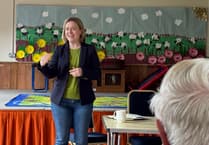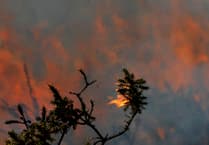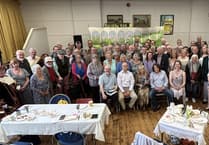A WATCHING brief is to be kept on a herd of wild boar in West Devon — despite fears the animals are doing serious damage to an environmentally sensitive area and could pose a risk to residents and grazing livestock. A packed meeting involving Dartmoor National Park Authority, the police, wildlife experts and residents was held in Buckland Monachorum on Tuesday — the area around which there have been numerous sightings of the wild pigs and one reported attack on a dog. Parts of Roborough Common have also been extensively dug over by the rooting animals. Buckland Monachorum resident Geoff Lakeman said action should be taken sooner rather than later: 'There are perceived dangers here, not the dangers of people being attacked so much, but people could stumble on horses, you could be getting twisted and broken ankles, there could be dangers to other animals — there is a whole list of natural potential problems.' Mr Lakeman said while the police might not receive repeated calls about attacks, people would not bother to ring them about the effect the animals were having on public amenity or grazing land. 'What's going to be done about that? We might have a very nice paper written on this in 12 months' time but God knows what mess will be left by then.' Horrabridge resident Alastair Cunningham, animal health and welfare officer for Plymouth City Council, did not believe the animals should be left to roam wild in an area used extensively by dog walkers and, soon, cyclists using the new cycle route between Tavistock and Yelverton. Local dog walker Jenny Brewer said if people were content to allow formerly indigenous species like boar to live wild in the area, why not introduce bears and wolves too? 'I would like to see them rounded up and taken back to wherever they came from, and I think most people who ride horses up there or walk dogs would like to see that,' she said. But John Taynton, chairman of Horrabridge Parish Council, felt the dangers were being exaggerated: 'There is a lot of uneccessary worrying going on — maybe we should look at the possible advantages of them, in terms of tourism, and there may be benefits ecologically as well.' Wildife expert Charlie Wilson, of Natural England, said the boar were omniverous, although 90%of their diet consisted of roots and vegetation. They thrived in woodland areas and tended to have one litter of piglets a year, typically of four to five babies. He said the number of recorded attacks by wild boar in the world was 'vanishingly small' though he conceded animals which have been in recent captivity were more likely to be unafraid of humans. He said it was impossible to say how many boar were living in the Buckland area. Pete Stevens, of Natural England, said although damage on the commons appeared serious, it actually only covered about 5% of the area. The boars were also destroying bracken, which could be considered advantageous. Firearms officer Barry Collacott stressed the only people allowed to shoot the boar were those with a firearms certificate which specifically permitted boar shooting — the landowner's permission was also required. He said anyone found illegally killing the animals would have their licences immediately removed. There have been no reported sightings of boar in the last couple of weeks in the area. Following a proposal by West Devon councillor Diana Moyse, it was agreed the DNPA, Natural England and the landowner, Maristow Estates, would monitor the situation for six months and a report drawn up.



